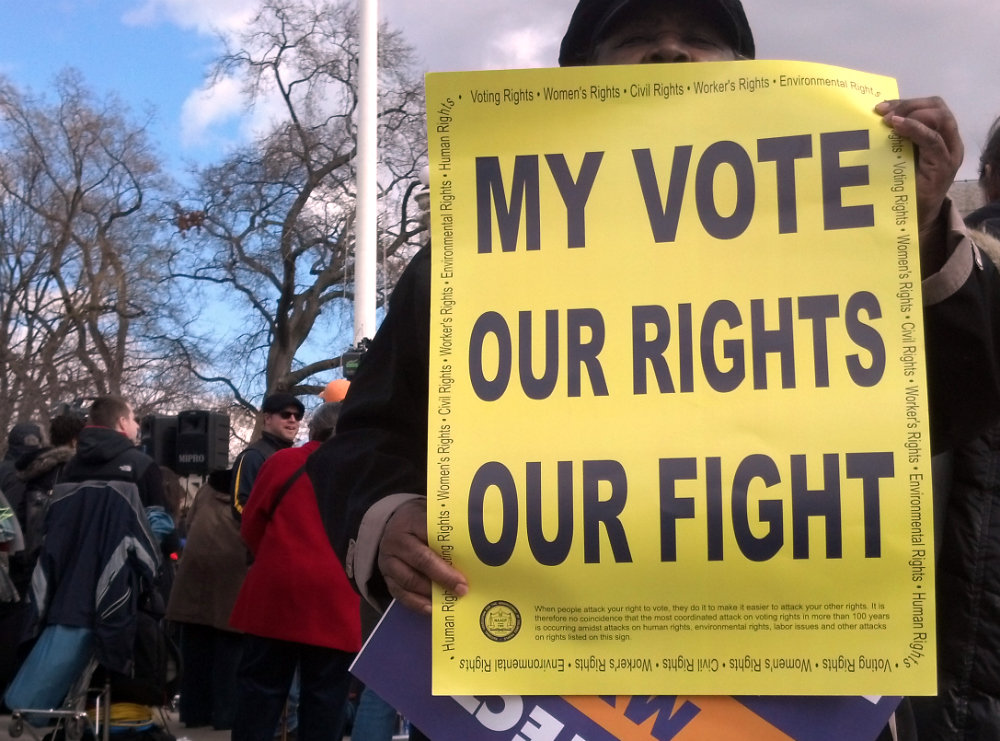UCC advocates commit to restore voting rights on 50th anniversary of Voting Rights Act
 In 2013, the Voting Rights Act of 1965 was severely weakened when the U.S. Supreme Court deemed a key provision of the act as unconstitutional in the case of Shelby v. Holder. On Thursday, June 25, the 50th anniversary of the passage of one of the country’s most important pieces of legislation, United Church of Christ advocates are recommitting themselves to advancing voting rights for all people, while lamenting the setbacks in voting rights in the form of restrictive laws.
In 2013, the Voting Rights Act of 1965 was severely weakened when the U.S. Supreme Court deemed a key provision of the act as unconstitutional in the case of Shelby v. Holder. On Thursday, June 25, the 50th anniversary of the passage of one of the country’s most important pieces of legislation, United Church of Christ advocates are recommitting themselves to advancing voting rights for all people, while lamenting the setbacks in voting rights in the form of restrictive laws.
“In this 50th anniversary year of the Voting Rights Act, voters are more vulnerable to discrimination than at any time since the law was first passed in 1965,” said Sandy Sorenson, director of the UCC’s Justice and Witness Ministries office in Washington, D.C. “Unless Congress acts, voters in 2016 will face the first presidential election in 50 years where they will lack crucial protections in federal law to combat racial discrimination in voting.”
On June 25, hundreds of concerned Americans will join civil rights and voting rights advocates in Roanoke, Va., to mark the 2nd anniversary of the Shelby v. Holder decision. Attendees, including Sorenson and other members of the faith community, will rally to defend the right to vote and to support a restoration of the Voting Rights Act and inclusion for all Americans. Leaders representing diverse civil rights advocacy groups will speak at the rally, including leaders from the interfaith community.
“Virginia is one of the states that, before the Shelby decision, was required to have any proposed election changes reviewed by the Justice Department,” Sorenson said. “Roanoke is the largest city in southwestern Virginia, with a diverse population that is about one-third African American. But Rep. Bob Goodlatte (R-Va.), who represents part of Roanoke and chairs the House Judiciary Committee, has refused to even allow a hearing on the legislation in his committee.”
In the Shelby v. Holder decision, the Supreme Court examined Sections 4 and 5 of the Voting Rights Act, which was passed by Congress to prevent discrimination of voters in parts of the country with a history of voting discrimination. Section 4 lays out a formula that maps which state and local governments have a history of racial bias. The Voting Rights Act’s Section 5 clause required those state and local governments to notify Washington, D.C., to any changes to voting laws.
The Court ruled that Section 4 of the Voting Rights Act is unconstitutional and cannot be used since the map does not reflect “current conditions” of voter discrimination. The slim majority of the court –– via a divisive 5-4 ruling –– decided Section 4 violates the Constitution’s guarantee of equality among the states. Though the court didn’t strike down the law entirely, it became significantly crippled. Although Section 5 remains, it is ineffective unless Congress can develop a new formula to map which parts of the country to which it pertains.
The UCC General Synod has long supported voting rights and addressing obstacles to participation in the electoral process within the broader context of the civil rights struggle. In 2013, the General Synod adopted a statement calling on the church to publicly support voter’s rights through public statements, advocacy and actions. The General Synod witness around voting rights is grounded in the understanding that justice cannot be achieved unless the rules governing the democratic process are fair to all.
“Voting is at the heart of the democratic process,” Sorenson said. “It is the most fundamental access point for individuals to have a voice in the public policy decision-making process that can shape the future of our local, regional and global collective life. The right to vote is a value that transcends partisanship.”
Related News
A Prophetic Call for Justice and Peace in Palestine
The executive leaders of the United Church of Christ have issued the following statement...
Read More‘Love is Greater Than Fear’: Regional Youth Events get to the heart of gospel message
United Church of Christ teens attending this summer’s Regional Youth Events (RYE) are...
Read MoreUCC desk calendars available to order now
Prepare for your day, month and year with the United Church of Christ desk calendar —...
Read More


